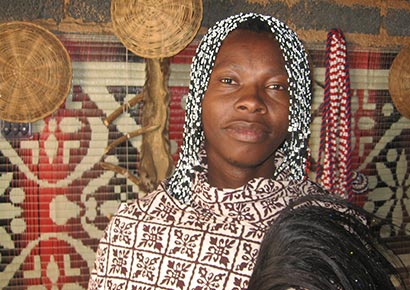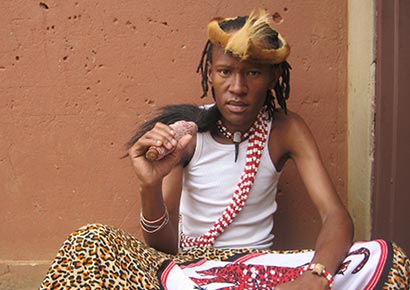Culture | Ancestors approve of gay traditional healers

Makhosini Skhosana
In South African black culture many still believe that homosexuality is a sin or unnatural.
Names like ‘broken hands’, ‘short tempered guys’, ‘isitabane’ (a person with two private parts) and many derogatory labels are often used when referring to gay people.
However, despite this stigma, some young gay men have become traditional healers who attend to heterosexual patients on a daily basis.
Gay healer Makhosini Skhosana, 35, believes that homosexuality is not un-African and not a sin according to our culture. Gay life existed in Africa before Jesus Christ was born, he insists.
“My grandfather told me that there have [always] been gays in the rural areas,” Skhosana says. “There were gays in the days of Shaka Zulu during the colonial period and also during the resistance towards the policy of apartheid. That’s why we get to know people like the late Simon Nkoli, an openly gay veteran of the ANC’s armed wing, uMkhonto weSizwe (MK).”
And, perhaps black culture is more liberal than we think it is. Skhosana says that, “We as gay healers receive lots of patients because we are confident, loyal to our patients, dedicated to our work and we do not overcharge.”
Gugu Mthembu, 28, another gay healer, who lives in Vooslorus, a township to the east of Johannesburg, adds that gay healers are perfectionists. “We live life for today as if there’s no tomorrow. This means we go an extra mile in all that we do. Being a traditional healer is to be a mediator between the ancestors and people who come to healers as patients.
“Without ancestors there’s no traditional healing. We adhere to and follow our ancestor’s orders. We are easily approachable, we share ideas, laugh, talk with people from all sexes and we give the advice and the help they need”, he says.
Skhosana believes that if a person is born gay and proud of his or her sexuality he or she will not be shunned by members of the community for being a gay traditional healer.
The onus to represent oneself lies in every gay traditional healer’s hands, he argues. “Even heterosexual healers encounter problems from the community if they don’t respect themselves and their gifts as healers.”
Mthembu feels that if you can’t change what is happening you need to learn to live with it. “Being labeled is part of growing up gay in the townships. It is common, so we do not stress ourselves about names. I believe the intentions of many who call us names are not to hurt us but to hide their feelings that they are interested in us or are also gay like us.
“I am saying this because the same people who label us when it’s dark, they propose to us, come to us as traditional healers when they have problems and others are overprotective with us while in the pubs having some fun,” he explains.
“It is not against our culture to be a gay healer”
Skhosana lives in Tsakane, another township east of Johannesburg. “At home they suspected that I was gay when I grew up,” he says. “At the age of 18 after completing my matric I met my first boyfriend from the rural side of KwaZulu-Natal, where traditional culture is practiced to a very large extent. He wanted to pay lobola (paying the bride’s price) for me. Eventually they all realised that their suspicions were true. My father denied the lobola money, saying he will think about it.”
Skhosana says his calling to become a sangoma started when he began to suffer from pains in his knees, swollen feet, problems with his kidneys and sleepless nights.
“I would sleep for as little as thirty minutes and I would hear sounds of nature, like the roar of a lion, the sound of the ocean and the whistling of birds; as if they were with me in the room. Medical doctors failed to diagnose any sickness,” he says.
“I went to consult a traditional healer with my grandmother and I was told that I have a calling and I must become a traditional healer. I stayed for two years in the initiation school in Natal with the help of my boyfriend. In 2001 I began to practice as a healer. My ancestors have nothing to do with my sexuality. I respect what they want from me but it is none of their business who I sleep with or marry.”
Mthembu adds that ancestors present themselves to you while seeing the life you are living. “I have a boyfriend of seven years and he understands that I am a traditional healer. My head ancestor is a man, my grandfather, and he died knowing that I sleep with men. He had a wife, my grandmother. That does not mean I must have a wife.
“What they want from me is to heal the sick using traditional medicine, which is plants. I will displease my ancestors if I do not heal the sick. That means they approve of our sexuality.”

Gugu Mthembu
Mthembu goes on to dismiss sangomas who claim they are possessed by a female ancestor and are thus forced to sleep with men. “They are in the closet. They shield themselves with the name of being a sangoma. There’s no ancestor who will choose a partner for you to sleep with or fall in love with”, he states.
I have conducted one-on-one interviews with more than ten gay healers in the townships around Gauteng province. When talking to healers who are not gay, they say that if the ancestors disapprove of homosexuality then we wouldn’t have gay traditional healers. It is as simple as that.
Consider also that Themba Mantinti, an openly gay man, was appointed as Chairperson of the Ekurhuleni Traditional Healers Association, which assists healers in obtaining practicing certificates.
“It is not against our culture to be a gay healer,” Mantini says. “What is important is for the healer to heal the sick. We work hand in hand with clinics using western medicine. If a patient is HIV positive we advise them to take ARVs instead of traditional medicine,”
Mantini adds that, “Gay healers are hard workers, they give love and they do follow ups to their patients. It is one of the reasons they receive a high number of patients.”
Mthembu agrees: “I believe we [gay people] have a place in our tradition. If one delivers what is expected by the ancestors, the person will not go out and look for patients. Ancestors will bring patients to him or her.”
- Facebook Messenger
- Total173
Leave a Reply